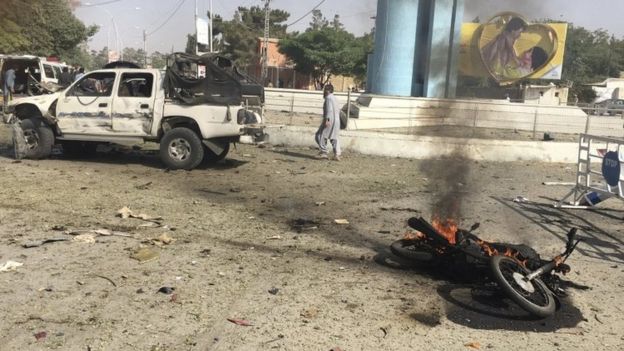Pakistan's Day Of Violence: Scores Killed As Blasts Hit Parachinar And Quetta
THE CITIZEN BUREAU

NEW DELHI: The death toll from blasts that targeted security personnel and civilians in Pakistan’s Quetta and Parachinar has touched almost 100, media reports say. Around 200 injured are being treated, with some critical.
In Parachinar, a bomb went off in Turi Market as people were shopping for Eid. A second bomb was timed to go off at the market, with the aim to target people who rushed to help the victims of the earlier explosion. At the time of writing, almost 70 people were killed in the two blasts in Parachinar, with 200 wounded. The attack took place in a predominantly Shia Muslim area.
Militancy in Pakistan has a sectarian nature, with sunni militant groups -- including the Tehreek-i-Taliban Pakistan (TTP) and the Islamic State -- considering Shias heretics. Human Rights Watch recorded at least 450 killings of Shia in 2012, the community’s bloodiest year; at least another 400 Shia were killed in 2013. While sporadic sectarian violence between Sunni and Shia militant groups has long persisted in Pakistan, attacks in recent years have been overwhelmingly one-sided and primarily targeted ordinary Shia going about their daily lives.
Meanwhile, in Quetta, two outfits claimed responsibility for a suicide car bomb blast that killed 15 people. Both the Jamaatul Ahrar -- a splinter group of the banned Tehreek-i-Taliban Pakistan, and the militant Islamic State group claimed responsibility for the attack. The bomb went off outside the Balochistan police inspector general’s office at Shuhada Chowk.
"Terrorists are attacking soft targets and no Muslim can ever imagine to commit such horrific act," Pakistani Prime Minister Nawaz Sharif said in a statement. "Such acts of terrorism will be dealt with the full power of the state."
The attack, in fact, is symptomatic of the increasing ethnic and sectarian violence in Balochistan -- Pakistan’s largest but least populous province. A power vacuum has emerged in Balochistan, creating a potentially explosive environment in this southeastern province that borders volatile areas in Afghanistan.
The repressive measures adopted by the Pakistani government have weakened the social structures capable of containing radicalism. This is evinced by the fact that most Baloch nationalist parties began by articulating their discontent not in the demand for independence but within the legal framework of the constitution to demand more autonomy and rights. Over the years, in large part because of the repressive tactics adopted by the State, the Baloch nationalist movement has gotten more radicalised. The irony lies in the fact that the measures adopted by the Pakistani state are reinforcing the threat of ethnic nationalism whilst seeking to eliminate these separatist elements.
In addition to nationalist groups such as the Baloch Liberation Army (BLA), the Baloch National Movement, the National Party, the Balochistan National Party, and the Baloch Student Organisation, there has been an increase in sectarian groups in a province traditionally known for its secularism. Afghan and Pakistani Taliban (Tehrik-e-Taliban Balochistan), al-Qaeda, Lashkar-e-Janghvi, Sipah-e-Sahaba Pakistan, Imamia Student Organization, and Sipah-e-Muhammad have reportedly established their presence in the province.
Analysts ascertain that the Sipah-e-Sahaba and Lashkar-e-Janghvi possibly enjoy official protection, as they continue to hold major rallies publicly in the face of a ban. There has been an expansion of operational spaces for violent sectarian groups to function within, in Pakistan nationally, and in Balochistan specifically, as the government’s capacity and perhaps even willingness to investigate, prosecute and convict those involved in violent attacks is compromised.
It is important to note that the repressive measures are furthering sectarianism in a region where a resolution through dialogue and within the constitutional framework is politcally feasible. According to a survey, only 37 percent of the Baloch people favour independence, a figure even lower among Balochistan’s Pashtuns. However, 67 percent of the population wants greater autonomy. This indicates the possibility for compromise through political negotiation. The government of Pakistan has to stop treating Balochistan as a law-and-order problem; its insistence on doing so by responding to the crisis through repressive measures will only lead to an increase in the numbers favouring independence and a rise in violence in the region.


